Why attend a conference centered on science policy?
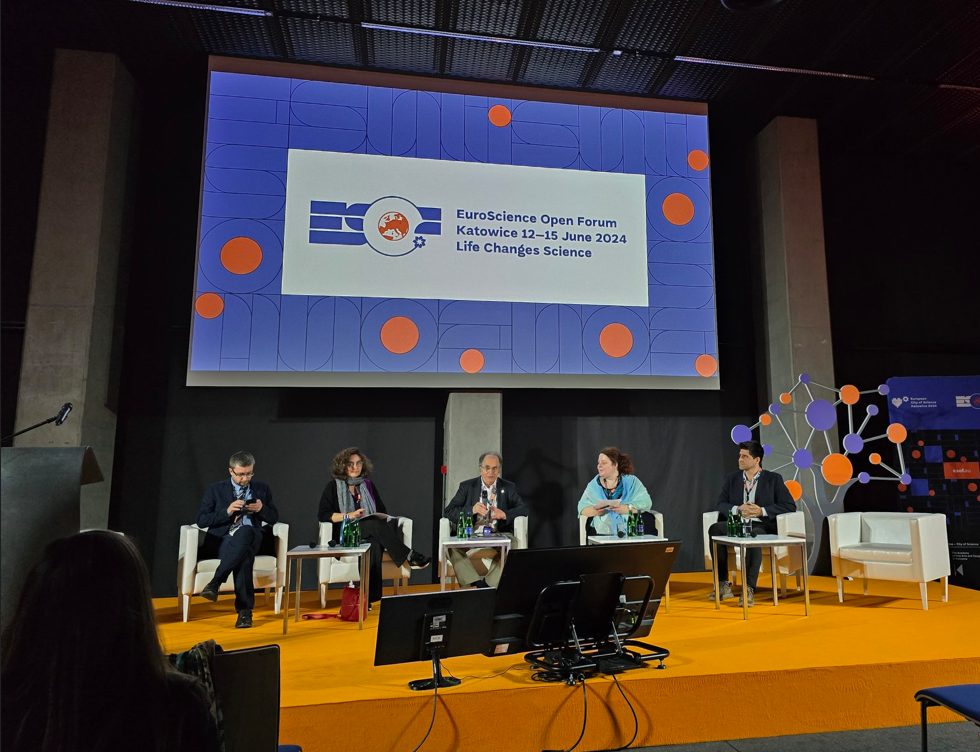
If you are interested in going beyond purely scientific conferences, you should try out some which are related to science policy and see the difference! Such conferences and events are really important for the entire researcher community, thus we hope that the EuroScience Open Forum discussed in this post will be continued, and that interested stakeholders can meet also on other similar events soon, including the inaugural Hamburg Science Summit or the World Science Forum 2024. Alternatively, I would suggest including science policy or science advice for policy related sessions and panels at disciplinary scientific conferences, as well as getting researchers more engaged and involved in those activities.
The EuroScience Open Forum (ESOF) is a biennial meeting organized by EuroScience since 2004, with the support from the European Union, and lately generally held in a city which is also designated as the European City of Science that year. In addition to inter- and transdisciplinary discussions about research and innovation, the event provides a unique platform for debates on science policy and research culture and is a place to meet like-minded researchers, not only from Europe but from all around the world. In addition, you do not only meet researchers, but also political decision-makers, representatives of industry, the press, NGOs and researcher organizations. In this post, I’ll try to provide a personal perspective on why I consider it one of my best conferences, and thus why I would recommend all researchers attend similar events.
Via the Young Academy of Europe (YAE) and its two task forces, I contributed to the organization of two ESOF events. In 2022, for the event held in Leiden, we successfully suggested two panels with fellow YAE members: one entitled ‘New radical career paths for researchers – breaking the existing norm of short-term contracts leading to precarity’ and another ‘The Chair: Fact or Fiction? Addressing the challenges faced by women leaders in academia’. Already the title of this second one shows that this conference is aiming at fostering unconventional dialogues about topics highly relevant for researchers. Inspired by the Netflix series entitled ‘The Chair’, phenomena related to women leaders such as the glass ceiling and the glass cliff were discussed. In addition, the actual Chair of YAE at the time, Gemma Modinos, gave a keynote lecture about ‘Sustainable Academic Careers: Young Scholars’ Perspective’. I had no possibility then to attend this Leiden ESOF event in person but had very positive feedback from colleagues about it and our panels.
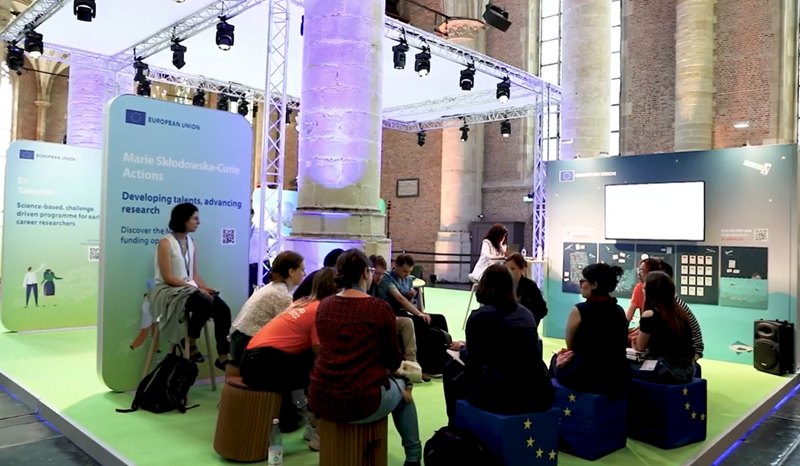
This year, between 12–15 June 2024, the EuroScience Open Forum (ESOF) was organized in Katowice, Poland. The event had more than 3500 participants and 100 thematic sessions led by over 400 speakers. In addition, on 13 June the 2nd European Talent Fair also took part at the same location, providing in this way a good opportunity for those interested in jobs or in their career prospects to take part in lectures, panel discussions and various workshops about specific career paths in academia or beyond, and about transversal skills and their development.
The detailed ESOF2024 and European Talent Fair programmes are available so, instead of attempting the impossible by trying to provide an overview or summary of the 100 thematic sessions and all keynote lectures, I’ll just try to give my personal insight into the conference. In addition to ‘merely’ or ‘purely’ scientific talks and posters, for me the most interesting ones were again those centered on science policy or policy-for-science. Probably this is related to the fact that since 2018 I have been strongly involved in this field. (First as founding member, board member and then co-chair of the Hungarian Young Academy, and later as member, board member, vice-chair and chair of the Young Academy of Europe, and fellow of the International Science Council.)
With the YAE, I again took part in co-proposing panels for the event. The first panel was centered on mental health in academia and was co-organized with the Researcher Mental Health COST Action and other relevant stakeholders under the title ‘Personal and systemic responsibility for developing resilience in research workplaces’. Similarly to other panelists, first I gave a short introductory talk in which I mostly discussed the special challenges of early- to mid-career researchers who are under huge stress while trying to prove themselves as researchers, securing permanent positions, setting up and leading their own research groups, and having at the same time often caring duties as members of the sandwich generation both towards their kids and their parents. After the introductory talks of other panelists, we had many relevant questions from the audience and a very interesting and vivid discussion about how we could improve research culture.
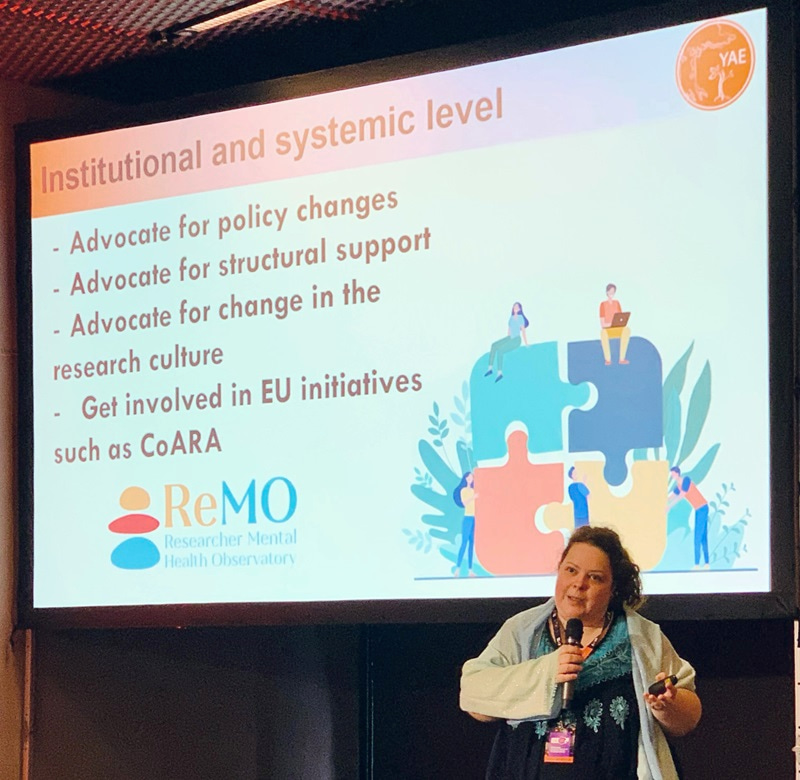
The second session, about ‘The 2022 Manifesto for Early Career Researchers and its impact’, was co-proposed with the Initiative for Science in Europe (ISE), and we discussed in it issues related to the precarity of research careers and measures to improve the situation of early- and mid-career researchers in Europe. Again, the panel consisted of short statements from the panelists, followed by questions by the moderator and from the participants of the session.
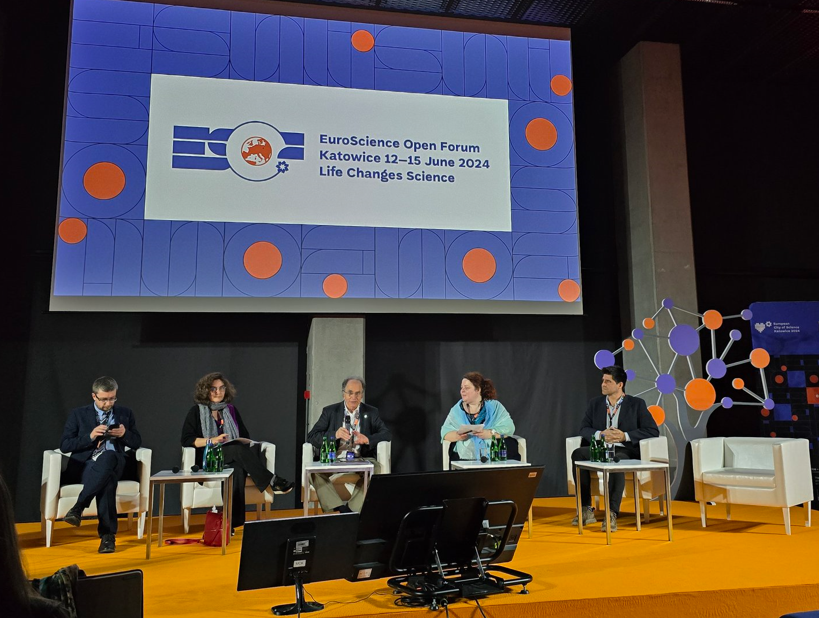
I really liked the ambiance of the sessions in which I participated, but also the informal parts and networking in the coffee and lunch breaks, and the gala dinner and reception. All questions and discussions showed the mutual respect of all participants, and the good will of the various stakeholders present to make a difference in the current research culture and to improve the academic landscape. I really think it is important to have such meetings and to talk openly about problems and challenges that are in fact threatening researchers and science all around the world. As an eternal idealist, I really liked to exchange thoughts, best practices and ideas on these challenges with the participants, and I had the feeling that together we can make a difference! Two months after the event I am still wondering why I was so enthusiastic about ESOF, but I think that it was basically related to the overall positive and enthusiastic ambiance created by like-minded and very open people, and the fact that we could so easily get connected with all participants from all over the world, from members of the very recently launched Mexican Young Academy to Eurodoc, MSCA and senior researchers, research staff members and policy makers.
What next?
EuroScience was a membership-based non-profit association founded in 1997 with the aim of supporting and promoting science and technology in Europe. I say ‘was’, because early this year it went bankrupt. EuroScience was unique as, in addition to professional scientists and scientific organizations, its membership was open also to policymakers, NGOs, industry-related organizations, as well as members of the general public. It was also the main organizer of ESOF. In this respect, I was honored to being invited to a panel entitled ‘Is there room and necessity today in Europe for an organisation that would renovate what EuroScience did in the past: a constructive debate’. This session was highly relevant for the future of ESOF. The panel featured among others the representative from the Polish private university (WSB University), which bought the ESOF trademark and promised to continue with organizing similar events in the future.
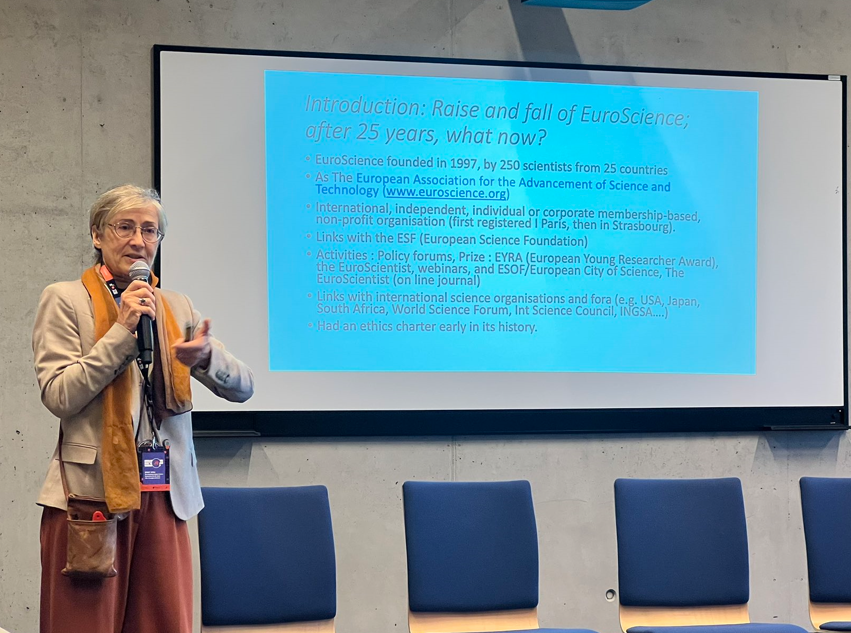
Below, I would like to draw your attention to two upcoming events that will offer similar possibilities for discussions and exchanges about the situation of researchers and science in Europe with representatives from science, politics, business and NGOs. The first one is the inaugural Hamburg Science Summit organized by the Körber Stiftung on 19 September 2024 in Hamburg. The conference bears the title ‘Europe’s Path Towards Tech Sovereignty’ and, among others, aims at discussing how Europe can keep up in key areas such as artificial intelligence, energy storage and medical technologies. With the YAE we will be hosting a session embracing panelists from all career stages and discussing the prospects of embarking on an academic career path in Europe.
Between 19–23 November 2024, Budapest will host the World Science Forum (WSF), a high-level global science political forum for important stakeholders involved in science policy, science diplomacy, and science advice for policy. With the YAE and several other similar organizations we are planning to contribute to the WSF with side events centered around topics important to early- to mid-career researchers. See you at these meetings!
Supporting science policy conferences
As some final thoughts, I would like to advocate for providing financial support for researchers to attend science-policy related conferences. ESOF2022 had a registration fee, but ESOF2024 was free to attend to any interested stakeholders (though for food you may have had to pay if you requested, for example, lunch on site). Due to equity and diversity of representation, I would strongly argue to have no registration fees for those events. Furthermore, I would also advocate for funding agencies, institutions and countries to offer dedicated scholarship schemes supporting participation of relevant stakeholders on science policy related events. For researchers in countries with limited funding possibilities and strict financial rules concerning how they can spend their grant or institutional money, at the moment funding to attend those meetings is really challenging. These enthusiastic people are already investing their time and energy to work towards a more inclusive, sustainable and efficient research culture, so I really do not think they should pay for their travel and accommodation and other costs from their own money. This is the least the academic system should do to recognize their efforts.
Also, to get researchers more engaged with science policy, I would suggest disciplinary conferences (dedicated to gathering researchers from a country or internationally who are working on a given topic or in a given field) to dedicate one or two sessions and panels for discussion about science policy related topics relevant to their field. One good example for this was the Regional Biophysics Conference organized in Pécs in 2022, where local organizer, Beáta Bugyi, initiated a session dedicated to young investigators in which, among others, I could share and discuss my thoughts with the audience about the benefits and beneficiaries of national and international young academies. It was also a nice experience to have this type of discussion on a conference at which I was otherwise moderating a session about ‘Membrane and ion channel biophysics, cell mechanics’ and giving a scientific talk about my latest research centered on ultrastructural and biophysical studies on plastid membranes under salt and drought stress. I think that all these initiatives are highly beneficial to recognize, draw attention to and in a way celebrate and embrace the diversity of researcher competences and activities that we need to have if we want to have sustainable and healthy research culture and academic landscape. It must be added indeed that these meetings cannot replace large interdisciplinary and transdisciplinary meetings where not only researchers, but other highly relevant stakeholders from politics, business, publishing industry and NGOs are taking part in discussions in a wider context on societal and scientific challenges.
Top image by the EuroScience Open Forum (ESOF).
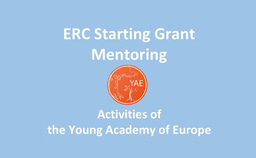
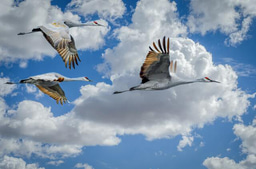
Join the FEBS Network today
Joining the FEBS Network’s molecular life sciences community enables you to access special content on the site, present your profile, 'follow' contributors, 'comment' on and 'like' content, post your own content, and set up a tailored email digest for updates.